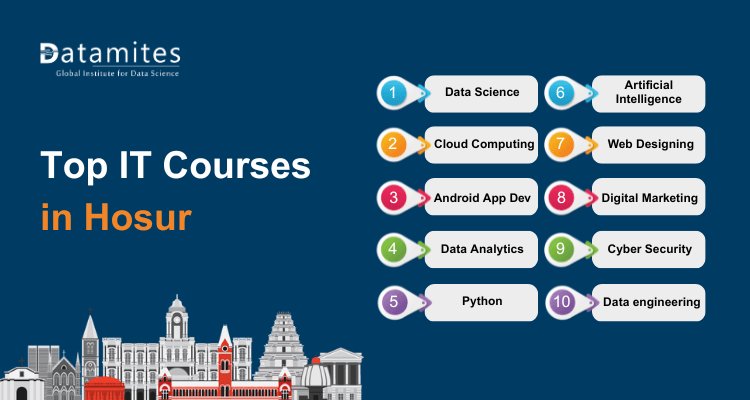Data Science Career Scope in India
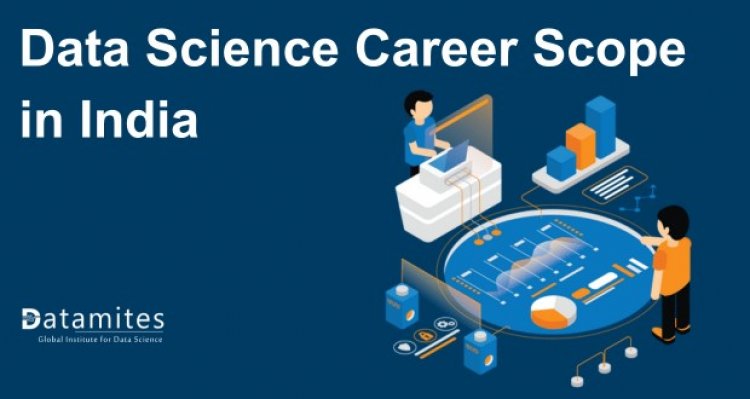
Have you ever wondered what powers today’s era of information and technology in India? At its core lies Data Science – a field that is not just thriving but revolutionizing industries across the nation. Why is Data Science becoming a cornerstone in India’s technological advancement? The answer is simple: an unprecedented explosion of data! This surge has created a vast demand for skilled professionals who can turn data into insights, driving decisions in sectors from finance to healthcare.
If you are curious about the opportunities and pathways that lie ahead in a data science career in India, you are at the right place. This article is your compass, designed to navigate the dynamic and promising landscape of data science in India. Let’s embark on this journey to unlock the potential and scope of a career in data science in the heart of one of the world’s fastest-growing economies!
Understanding Data Science
Data Science is like a magic wand in our digital world, turning a sea of data into useful insights. Imagine a world filled with data from every click, swipe, and search. Data Science is the process that makes sense of all this information, turning it into valuable knowledge that can help in decision-making. It’s not just about numbers and computers; it’s an exciting mix of prediction, analysis, and technology that guides choices in nearly every field you can think of.
Data scientists are like the superheroes of the business world. They dive into heaps of data and find patterns and answers that no one else can see. They help doctors predict diseases, financial experts see market trends and online stores understand what customers want. Their work is more than just looking at numbers; they predict the future and make plans based on data.
The data science and big data industry in India, as reported by Dataquest, is booming. Valued at Rs 17,615 crore in FY18, it’s projected to skyrocket to Rs 1,30,000 crore by 2025, signifying a rapid growth trajectory and highlighting India’s increasing prominence in the global data landscape
What makes data science truly remarkable is its ability to converge various domains of knowledge, epitomizing the scope of data science in India. It’s where math meets computer programming, where statistics meet problem-solving, and where industry knowledge meets huge sets of data. This mixture of different skills and knowledge areas is what makes data science not just interesting but essential today, where understanding data is key to innovation and progress.
Refer these below articles:
Educational Pathways for Data Science Career in India
Embarking on a data science career in India is like preparing for an exciting journey, and the first step is the right education. While there’s no fixed route, certain qualifications can pave a smoother path. Typically, a bachelor’s degree in fields like computer science, statistics, or even mathematics lays a strong foundation.
Why these subjects? They’re the building blocks of data science, offering a blend of critical thinking, technical know-how, and a keen understanding of data. Think of these degrees as your passport in the data science world, opening doors to opportunities and giving you the tools to understand the language of data.
However, just having a degree in a related field isn’t always enough. The world of data science is fast-paced and constantly evolving. This is where specialized data science certifications come into play. They’re like booster rockets that propel your data science career forward, offering up-to-date knowledge in areas like machine learning, big data, and artificial intelligence. Data Science Certifications in India are not just pieces of paper; they’re proof of your commitment to staying ahead in the game, keeping your skills sharp and relevant in a competitive job market.
In a nutshell, your educational journey in data science is a mix of foundational degrees and continuous learning through certifications. The field demands not only a solid academic background but also a dedication to lifelong learning. By combining a relevant bachelor’s degree with ongoing data science certifications, you’re not just building a resume; you’re crafting a toolkit that will keep you adaptable, skilled, and always in demand in the ever-changing world of data science.
Key Skills and Tools in Data Science
1. Essential Technical Skills
Data science is a field where technical prowess is paramount. Here are the key data science skills that form the backbone of a data scientist’s toolkit:
- Programming: Proficiency in languages like Python and R is crucial. They are adept in data manipulation and analysis.
- Machine Learning: Understanding machine learning algorithms is like having a secret weapon to predict patterns and behaviors.
- Data Visualization: Tools like Tableau or Power BI are essential for turning complex data into understandable and actionable visuals.
- Statistics and Mathematics: A strong grasp of statistics and mathematical concepts is the foundation for making sense of data.
- Big Data Technologies: Knowledge of platforms like Hadoop and Spark is increasingly important as the world of data grows exponentially.
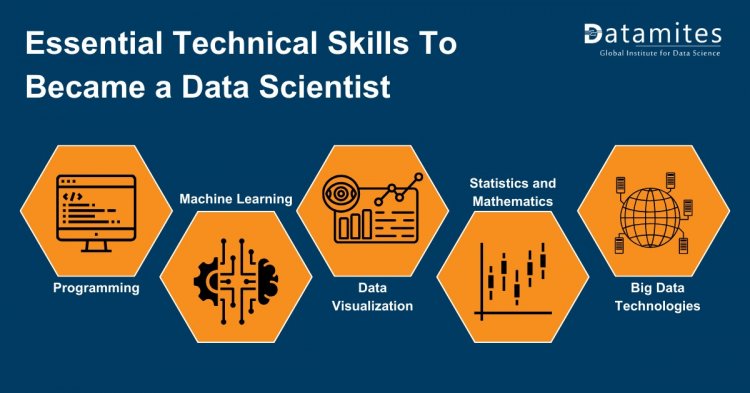
2. The Power of Soft Skills
While technical skills are key, the role of soft skills cannot be overstated:
- Problem-Solving: Like detectives, data scientists use logical reasoning to unravel data mysteries and find solutions.
- Effective Communication: The ability to translate complex data findings into clear, actionable insights is crucial for collaboration and decision-making.
- Critical Thinking: This involves questioning assumptions and interpreting data contexts to ensure accurate conclusions.
- Teamwork and Collaboration: Data science is often a team sport, requiring collaboration with other professionals.
- Adaptability: In a field that’s constantly evolving, being adaptable to new tools and technologies is essential.
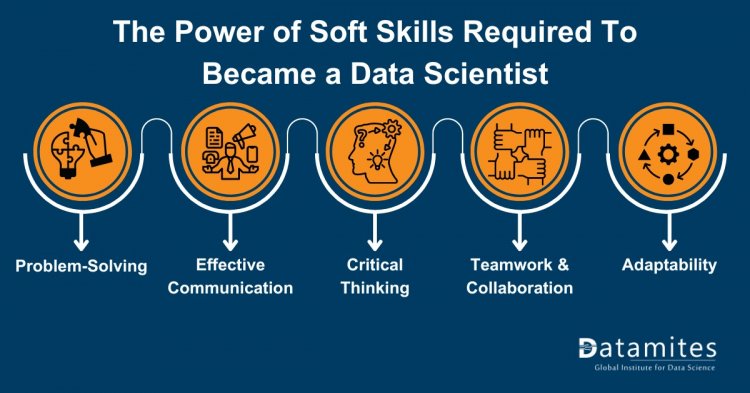
3. Popular Data Science Tools and Platforms
Data scientists utilize a variety of data science tools and platforms to handle, process, and analyze data:
- Python: A versatile language favored for its libraries and community support.
- R: Especially powerful for statistical analysis and visualization.
- Tableau: A leader in the visualization space, turning data into comprehensible graphics.
- SQL: Essential for database management and querying.
- Jupyter Notebooks: Great for prototyping and sharing data science projects.
- TensorFlow and PyTorch: Popular for deep learning applications.
A successful career in data science in India requires a blend of robust technical skills, strong soft skills, and proficiency in key tools and platforms. This combination enables data scientists to effectively extract insights from data and communicate their findings, making them invaluable assets in any data-driven organization.
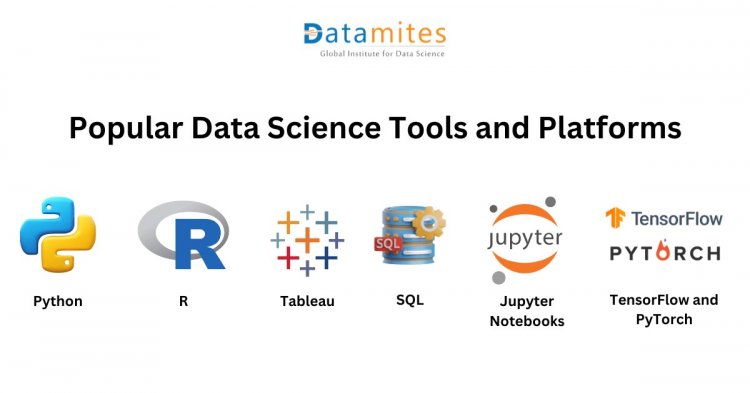
Data Science Jobs in India
The burgeoning field of data science in India is vividly illustrated by LinkedIn‘s listing of over 93,000 Data Scientist Jobs in India. This impressive figure highlights the vast demand for data science professionals in the country, signaling a thriving job market and numerous opportunities for those skilled in this cutting-edge domain. This surge in job openings reflects India’s growing prominence as a hub for data science and analytics expertise.
The landscape of data science offers a range of exciting data science job roles in India, each catering to different aspects of data handling and analysis:
- Data Analyst: Responsible for interpreting data, performing analysis, and creating reports. Skills needed include proficiency in statistical analysis, knowledge of SQL, and experience with visualization tools like Tableau.
- Machine Learning Engineer: Focuses on designing and developing machine learning models. Requires a deep understanding of machine learning algorithms, programming expertise in languages like Python and R, and familiarity with AI and neural network technologies.
- Data Scientist: Involves complex problem-solving using data modeling, predictive analysis, and algorithm development. Key skills include advanced analytics, programming, and a strong foundation in mathematics and statistics.
- Data Engineer: Specializes in managing and optimizing data workflows and infrastructure. Essential skills include knowledge of database management, ETL (Extract, Transform, Load) processes, and big data technologies like Hadoop and Spark.
- Business Intelligence (BI) Analyst: Transforms data into actionable business insights. Requires a strong background in database technology, data analytics, and proficiency in BI tools.
- Data Architect: Designs and manages an organization’s data architecture. Key responsibilities include developing database solutions, managing data storage, and ensuring data quality. Requires deep knowledge of database technologies and data modeling techniques.
- Statistician: Specializes in statistical analysis and interpretation. They apply statistical theories and methods to solve problems in business, engineering, healthcare, etc. Proficiency in statistical software and a strong foundation in statistical theory are crucial.
- NLP Scientist (Natural Language Processing): Focuses on developing systems that understand and interpret human language. Requires knowledge in linguistics, machine learning, and programming languages like Python.
Read this article: Difference Between Data Science and Data Analytics
Responsibilities and Required Skills
- Data Analysts and BI Analysts primarily focus on analyzing data and providing insights for business decisions.
- Data Scientists and Machine Learning Engineers are involved in more complex tasks like building predictive models and algorithm development.
- Data Engineers ensure the availability and usability of data for analysis.
- Data Architects create the design plans for data management systems.
- Statisticians apply statistical methods to collect and analyze data.
- NLP Scientists work on AI systems that can understand and respond to human language.
The demand for data science roles spans a wide array of industries in India, from IT and telecommunications to healthcare, finance, e-commerce, and more. This diversity not only showcases the versatility of data science as a career but also promises a dynamic and evolving professional landscape for aspiring data scientists.
Data Science Salary in India
The landscape of data science salaries in India presents an intriguing picture, influenced by factors like experience, location, and industry. Let’s delve into the average salaries across major cities and discuss the variables impacting these figures.
Average Yearly Salaries for Data Scientists in India
- Glassdoor: Reports an average annual salary of INR ₹12,00,000 for data scientists in India.
- Indeed: Indicates the average data scientists salary in India at INR ₹10,31,274 per year.
- Payscale: Offers an estimation of INR ₹9,53,360 as the average yearly salary for data scientists in India.
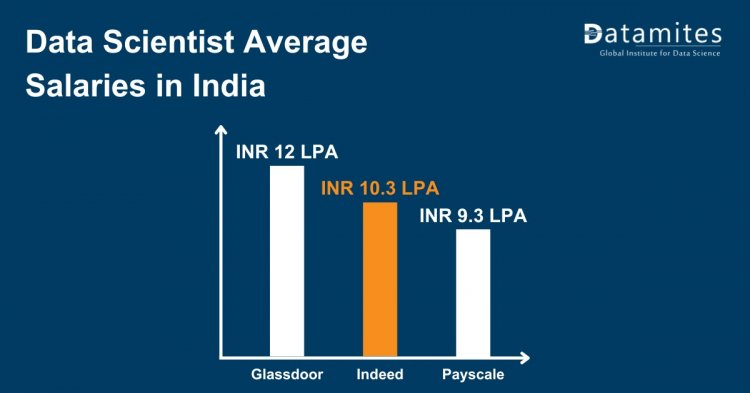
Factors Influencing Salary Variations
Several factors contribute to the variations in data science salaries across India:
- Experience: In India, the salary trajectory for Data Scientists is closely tied to their experience levels.
- Entry-level professionals with less than a year of experience can anticipate an average total compensation of INR ₹590,840.
- As they advance to early career (1-4 years), this figure rises to INR ₹884,660.
- Mid-career Data Scientists (5-9 years) see a significant jump, earning around INR ₹1,540,376.
- The compensation peaks for experienced individuals (10-19 years) at approximately INR ₹2,045,134.
- However, in their late career (20 years and above), it slightly dips to an average of INR ₹1,350,000.
- Skill Set: Advanced skills in machine learning, AI, and big data can lead to higher pay.
- Industry: Salaries vary across industries, with sectors like IT, finance, and e-commerce often paying more.
- Company Size and Reputation: Larger and more established companies tend to offer higher salaries compared to startups, although this can vary.
Average Salaries in Major Indian Cities
- Bangalore: Known as India’s Silicon Valley, the average salary for data scientists is around INR 15,00,000 per annum.
- Chennai: In this burgeoning IT hub, data scientists earn an average of INR 11,53,869 annually.
- Mumbai: The financial capital offers an average salary of INR 11,33,147 per annum for data science professionals.
- Pune: With a growing IT sector, the average data scientist’s salary here is INR 9,66,915 per annum.
- Hyderabad: Another IT hotspot, offering an average salary of INR 12,00,000 annually for data scientists.
- Ahmedabad: In this emerging market, the average salary is around INR 7,93,955 per annum.
- Kochi: A growing tech city, where data scientists earn about INR 8,63,745 annually.
- Delhi: The national capital offers an average salary of INR 13,50,000 per annum for data scientists.
- Kolkata: This city provides an average data scientist salary of INR 9,77,424 per annum.
The growth prospects in data science are not just limited to financial remuneration. The field offers extensive opportunities for career development, upskilling, and transitioning into diverse roles, making it a dynamic and future-proof career choice.
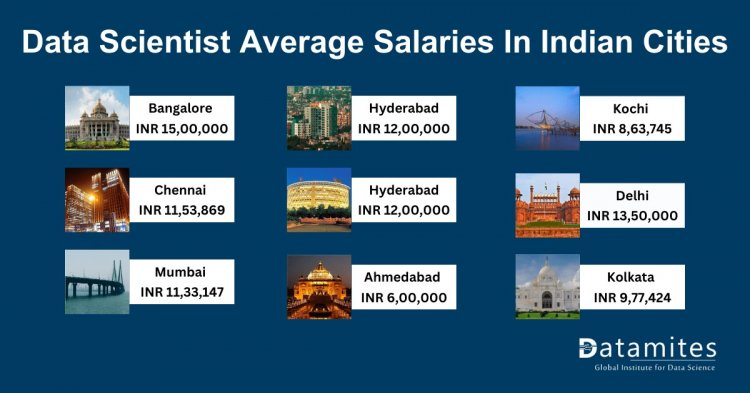
Emerging Trends in Data Science
The realm of data science is continually evolving, with several key trends shaping its future:
Artificial Intelligence (AI) and Machine Learning (ML): AI and ML are at the forefront, driving significant advancements in data analysis and decision-making. From predictive analytics to automated data processing, these technologies are transforming how businesses understand and utilize data.
Big Data: The exponential growth in data volume, velocity, and variety (the 3Vs of Big Data) is pushing the limits of traditional data processing tools. Big Data technologies are becoming crucial for handling, storing, and analyzing this vast amount of data efficiently.
Data Visualization Tools: As data becomes more complex, the importance of data visualization grows. Advanced visualization tools are being developed to make data more accessible and understandable to a broader audience.
Cloud Computing: The integration of cloud technology in data science offers scalable and cost-effective resources for processing large datasets, enhancing the efficiency of data analysis.
IoT (Internet of Things): IoT devices generate a massive stream of real-time data. Data science plays a key role in analyzing this data for insights that can lead to more efficient operations, enhanced customer experiences, and new product development.
Impact of Emerging Technologies on Data Science in India
These emerging trends are set to have a profound impact on the field of data science in India:
- Enhanced Business Intelligence: AI and ML are enabling businesses to transform vast amounts of data into actionable insights, leading to more informed decision-making and strategy development.
- Skillset Evolution: The demand for skills in AI, ML, and Big Data analytics is on the rise, requiring professionals to continuously upskill and stay abreast of the latest technologies.
- Market Growth: The integration of these technologies in various sectors is fostering a growth in the data science market, creating more job opportunities and driving economic development.
- Innovation in Services and Products: As companies leverage these technologies, there is a significant potential for innovation in products and services, tailored to meet the evolving needs of the market.
- Data Security and Ethics: With the growth of data science, issues surrounding data privacy, security, and ethics become increasingly critical. This requires a concerted effort to establish robust data governance frameworks.
Building a Data Science Portfolio
- Diverse Projects: Include a variety of projects in your portfolio to showcase a wide range of skills. From data cleaning and visualization to machine learning models, ensure each project highlights a specific skill set.
- Case Studies: Incorporate detailed case studies that demonstrate your problem-solving process. Clearly explain the problem, your approach, the tools used, and the outcome. This not only shows your technical proficiency but also your analytical thinking.
- Personal Projects: Don’t hesitate to include projects you’ve worked on for personal interest. These can be great conversation starters and show your passion for the field.
- Collaborative Work: If you’ve worked on team projects, include them to demonstrate your ability to collaborate effectively. Accentuate the distinct ways in which you contributed to the project.
Continuous Learning and Development
- Online Courses and Certifications: Enroll in online data science courses in India. So many data science institutes in India offer courses designed by industry professionals and universities.
- Reading and Research: Stay informed about the latest in data science by reading relevant blogs, journals, and books. Websites like Towards Data Science and Medium are great resources.
- Personal Projects and Experimentation: Continuously work on personal projects. They are great ways to apply new skills and can be excellent talking points during networking.
Participating in Competitions and Hackathons
- Competitions like Kaggle: Engage in online competitions. They are excellent for learning, applying your skills, and getting noticed in the data science community.
- Hackathons: Participate in hackathons, as they are great platforms to solve real-world problems in a time-bound setting. They also provide opportunities to network and learn from peers.
- Document Your Process: While participating, make sure to document your approach, challenges, and solutions. Incorporating this documentation into your portfolio could enhance its value.
Importance of Real-World Experience
- Internships and Freelancing: Gain real-world experience through data science courses with internships in India or freelance projects. This experience is invaluable and demonstrates your ability to handle real-world data and business problems.
- Open Source Contributions: Contribute to open source projects. It’s a way to get hands-on experience while contributing to the community.
- Blogging and Sharing Insights: Share your learning journey, project experiences, or insights on platforms like Medium or LinkedIn. This not only enhances your portfolio but also helps in building your professional brand.
Job Search Strategies
- Utilize Job Boards and Company Websites: Platforms like LinkedIn, Indeed, and Glassdoor are excellent for finding data science job listings. Also, regularly check the career pages of companies you are interested in, as they often post job openings there.
- Leverage Networking: Use your professional network for job referrals and insights into company cultures. Often, jobs are filled through referrals before they even get listed publicly.
- Tailor Your Application: Tailor your resume and cover letter to each application, emphasizing pertinent experience and skills that match the job description.
- Join Data Science Courses with Placement: Consider enrolling in data science courses with placement in India. These programs not only provide valuable learning experiences but also assist with job placement, connecting you with potential employers and increasing your chances of securing a job in the field.
Preparing for Data Science Interviews
- Technical Preparation: Be ready to demonstrate your technical skills. This might include coding tests, statistical analysis, and discussing algorithms or data structures.
- Project Portfolio: Be prepared to discuss your previous projects in detail. Explain your role, the tools and techniques used, and the outcomes.
- Behavioral Questions: Be ready for questions about your work habits, problem-solving approach, and how you handle team dynamics.
- Mock Interviews: Engage in mock interview sessions to build your confidence. Many data science training in India also offer career guidance and job preparation services, including mock interviews.
Also refer these below articles:
- Data Science Career Scope in Bangalore
- Data Science Career Scope in Chennai
- Data Science Career Scope in Pune
- Data Science Career Scope in Hyderabad
For those considering a career in this dynamic field, the time is ripe to dive in. The article emphasizes the expansive career scope in data science in India, highlighting a surge in demand for skilled professionals. Armed with the right skills and a keen understanding of the data science landscape, individuals can look forward to a rewarding and impactful career. Therefore, it is an opportune moment for aspirants to embark on their data science journey with confidence, ready to contribute to and benefit from this flourishing field.
DataMites, recognized for its outstanding data science course training in India, has emerged as a top institution in India. Strategically located in key areas of the country, including Bangalore, Chennai, Pune, and Hyderabad, DataMites offers comprehensive courses that are easily accessible to aspiring data scientists. The curriculum is thoughtfully crafted, focusing on imparting vital skills and knowledge needed to excel in the data science arena. The institute’s courses are distinguished by prestigious certifications from IABAC and NASSCOM, ensuring that students receive the best data science training in India. For individuals seeking high-quality, data science courses in India, DataMites is a reliable and respected option, laying a strong foundation for a successful career in the ever-growing field of data science.


